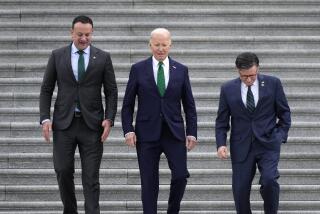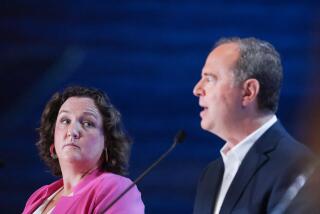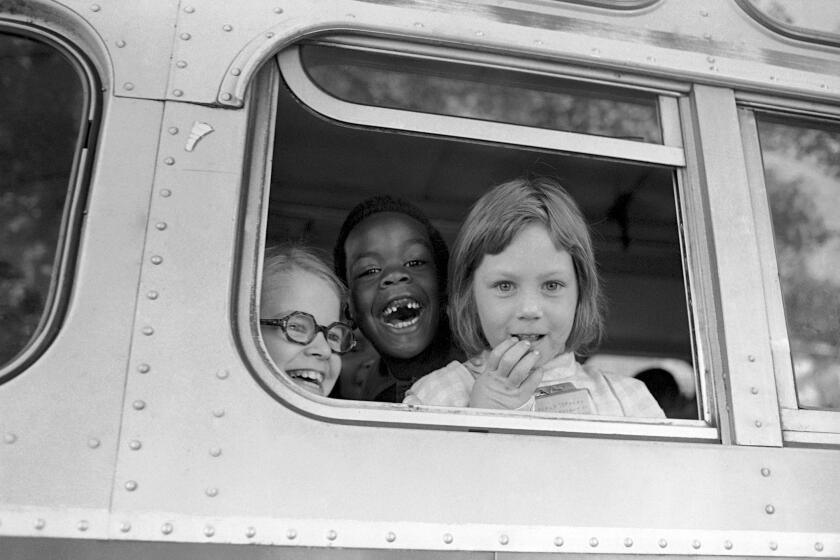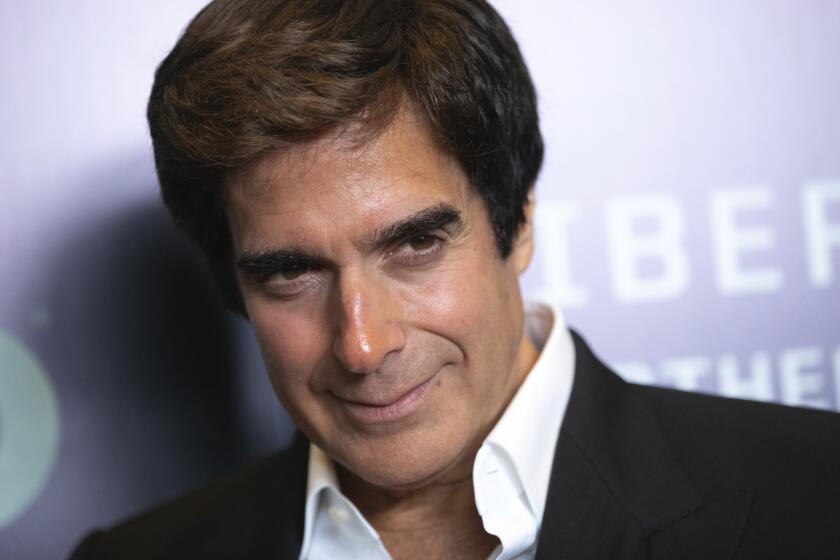$325,000 Gift to Democrats Raises New Set of Questions
The state of California says Yogesh K. Gandhi owes $10,000 in back taxes. His California driver’s license has been revoked because he has failed to pay his traffic fines. Two judgments for unpaid bills have been filed against him in court and he acknowledges he owes friends money.
Yet Gandhi, a great-grand nephew of Mahatma Gandhi and the president of the Gandhi Memorial International Foundation in Orinda, gave a hefty $325,000 to the Democratic National Committee--one of the party’s largest individual donations--at a fund-raising event in Washington last May.
Gandhi emerged Tuesday as the latest in a series of campaign donors whose contributions are raising questions about the influence of foreign money on American politics. Like the others, Gandhi’s contribution was handled by John Huang, the DNC fund-raiser who brought in a series of six-figure donations, some of which have proved illegal or suspect.
Where did Gandhi get the $325,000?
Gandhi, 47, said in an interview Tuesday that he had begun to reap the rewards of several technology transfer deals with companies in Australia, Austria and the United States “to get into the emerging Indian market.”
In August, however, he testified under oath in a Contra Costa County Small Claims Court that all of his funds came from his family trust in India.
How did a man who admits he is currently in debt arrange last May to buy 13 tickets at a $25,000-per-couple fund-raiser, and to be photographed presenting to President Clinton the Mahatma Gandhi World Peace Award? The award, which Clinton accepted in a separate room at the site of the DNC event, is an honor that the foundation has also bestowed on the likes of Ronald Reagan, Mikhail S. Gorbachev and Mother Teresa.
The DNC has said Gandhi’s contribution was legal because he has a green card establishing him as a legal resident, which under federal election law makes him eligible to give money to campaigns. Nonetheless, Gandhi’s was one of a number of large contributions that the DNC last week asked the Federal Election Commission to investigate because questions had been raised in press reports.
The White House says there was no connection between the contribution to the DNC and the decision to grant Gandhi and his foundation colleagues a private audience to present Clinton with the award.
But Gandhi himself added to the sense of mystery Tuesday. In a lengthy interview, he insisted that the money was his own, but he provided a vague account of precisely where he gained the wherewithal to make such a large contribution.
After years of living modestly, he said he suddenly began to enjoy the benefits of several international business projects in India.
“Some ventures are getting successful this year,” Gandhi said by telephone from the ranch-style foundation headquarters which doubles as his home. “This year I am hoping to generate a good amount of money and, for celebration, I invited [my mother and friends] to be my guest at this DNC fund-raising dinner.” The Washington event was organized by Huang, a former Los Angeles bank executive who specialized in raising money from Asian Americans for the Democrats.
Gandhi had written to the president on Feb. 5 to say that Clinton had been chosen to receive the Gandhi peace award--a life-size bust of the legendary Indian leader--and $100,000 in cash. The White House declined the offer in an April 17 letter to Gandhi.
At the May 13 fund-raiser, Gandhi approached DNC staff members at the Sheraton Carlton Hotel event with a request to present the award to Clinton, DNC spokeswoman Amy Weiss Tobe said. She said arrangements were made on the spot for the presentation in a separate room.
“The DNC didn’t see any harm in him presenting it to the president,” she said.
On Monday, Mark D. Fabiani, special associate White House counsel, said there was no connection between the award and the $325,000 contribution. “I don’t think there’s any relationship at all that we’ve seen,” he said.
Jane Sherburne, special counsel to the president, acknowledged that the handling of the award presentation was “a little peculiar.”
“I’m sure [Gandhi] was disappointed when he was turned down here and he found another opportunity that was less conventional,” she said.
Three months after the fund-raiser, Gandhi appeared in Municipal Court in Walnut Creek, Calif., to respond to a $3,000 small claims case, one of several such legal actions brought against him this year. Testifying under oath, Gandhi said he had no American bank accounts or assets and lived most of the time overseas.
“Well, so far I don’t live in this country,” he testified. “I live in India. And the family trust takes care [of] it. And when I come to [this] country, then [the] family pays. . . . “ he said. “They just give me the credit card and they charge it on the card if I need some money.”
Gandhi said in the interview Tuesday that, at the time of the small-claims hearing, he had “very little” of the more than $500,000 that he said he was paid for his business deals in April.
“I spent almost all of the money in the month of May,” he said. “May and June.”
Before the year is out, he said, he expects to receive “at least another million, million and a half” from companies that he declined to name.
Others, however, were skeptical.
Arun Gandhi, Mahatma Gandhi’s grandson who runs the M. K. Gandhi Institute for Nonviolence in Memphis, Tenn., said that Yogesh Gandhi was primarily interested in getting his photograph taken with world leaders “to show people how close he is to the power structure to open many doors and get him more money, which is his life’s ambition.”
In his opinion, he added, his distant relative was “a scam artist” who “has the gift of gab.”
Yogesh Gandhi says his goal simply has been “to promote the philosophy of Mahatma Gandhi.”
He said his grandmother was the daughter of Mahatma Gandhi’s brother. He was born Yogesh Kothari but added the Gandhi to his name in honor of his grandmother when she died.
He came to the U.S. in 1983, in the midst of renewed interest in Gandhi due to the Academy Award-winning film released that year, and started the foundation. He gained legal residence status here in 1987, although he remains an Indian citizen.
He said that the foundation has raised money to place statues of Gandhi in public places in New York, San Francisco and Honolulu and worked with “the local community on nonviolence education programs.”
Gandhi estimated that the foundation has raised $3 million to $5 million since its inception, mainly from the Indian community. But he acknowledged that it has garnered little since 1990 when “I got tired of raising funds and got involved in other activities.”
Among the winners of the award was Reagan, who was honored in the Oval Office in 1988. Gandhi said that Reagan was chosen simultaneously with Gorbachev, who received the bust in Moscow, to honor their signing of the INF treaty in 1987 to eliminate intermediate-range and shorter-range missiles.
Yogesh Gandhi said he and other foundation directors chose Clinton for the peace award because of the president’s efforts in Bosnia and the Middle East.
He said “no link was made” between the foundation award and his personal contribution by anyone he communicated with at the White House or the DNC.
Gandhi’s financial troubles include a state tax lien for $10,424 filed at the Contra Costa court.
Gandhi said the back taxes result from a misunderstanding with the state involving individuals who worked for the foundation on a contractual basis. He said that the individuals paid their state and federal taxes directly but that the IRS and the state said the foundation should have withheld taxes for these individuals as employees. He said the issue has been resolved with the IRS.
“We are in the process of solving this with the state,” Gandhi said. “It is not that we owe the taxes; we were assessed.”
Raj R. Jhavert, the foundation’s accountant, said Gandhi had contacted him within the past nine months seeking assistance on this matter but he never followed up.
Gandhi said the foundation currently has less than $500 in its account. “I’m in debt right now,” Gandhi said. “To my own friends. It’s a small amount.”
He filed his 1990 divorce papers in Contra Costa County as a pauper to avoid paying the filing fee, said Aldo P. Guidotti, an attorney who checked the court records. As part of the 1991 divorce decree, Gandhi was ordered to pay $500 per month for only four months to his former wife, Theresa Anne Marie Kothari Gandhi.
Gandhi said he had instructed his attorney to pay all the required court fees.
Two individuals previously involved with the foundation successfully sued Gandhi in a Walnut Creek Small Claims Court this year for back wages. They claimed that since 1994 Gandhi frequently refused to pay $200 per week for door-to-door fund-raising services. Gandhi said that the individuals were volunteers who subsequently claimed they were paid staffers.
In one case, Gandhi agreed to pay a $2,000 settlement in August on a court-ordered $3,046 judgment. In the other case, he has been ordered to appear in Small Claims Court Nov. 1 because he has failed to pay his default judgment of $5,000.
The plaintiff in the second case, Paul Quinlan, said in a telephone interview that Gandhi continues to refuse to pay the back income, even though he received a court order to do so back in May.
“When I was hired, he tried to present himself as nice, congenial, fairly sophisticated person with money and a simple life,” Quinlan said. “But in retrospect, he is a hoax.”
State motor vehicle records show that Gandhi’s driver’s license has been canceled. He said the state took the action because he had received traffic tickets but failed to pay them when he was traveling outside the country.
Gandhi said that he travels frequently and had just returned from a trip to Tokyo.
Inside the Gandhi foundation’s Orinda headquarters Tuesday, an easel in an empty conference room bore the following quotation: “If you really know what things you want out of life, it’s amazing how opportunities will come to enable you to carry them out.”
Times staff writer David Rosenzweig in Los Angeles and researcher Robin Cochran in Washington contributed to this story. Miller and Bunting reported from Washington and Dolan from Contra Costa County.
More to Read
Start your day right
Sign up for Essential California for news, features and recommendations from the L.A. Times and beyond in your inbox six days a week.
You may occasionally receive promotional content from the Los Angeles Times.







